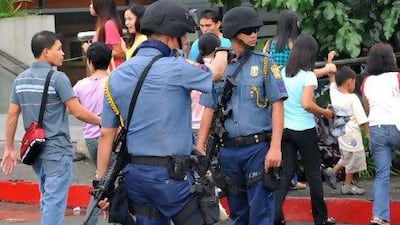MANILA // The Philippines yesterday placed security forces around the country on full alert after a number of foreign embassies issued travel warnings on the Southeast Asian country in the wake of a global terrorism alert.
"We are taking this seriously, and we know that this is creating apprehension," said the defence secretary, Voltaire Gazmin. He said local intelligence agents were trying to validate the reports.
Security in shopping malls in Metro Manila was stepped up, according to the police, but there was very little evidence of any build-up in the financial district of Makati, where a number of upmarket bars, restaurants and shops are frequented by foreigners and wealthy Filipinos.
The country's military chief, Lt Gen Ricardo David, was quoted by ABS-CBN television as saying that the military was constantly monitoring "homegrown threats" such as the militant Islamic Abu Sayaff Group (ASG) in the southern Philippines, which has links to the Indonesia-based Jemaah Islamiyah.
Jemaah Islamiyah, although fragmented in recent years after many of its senior leaders were arrested or killed by Indonesian authorities, still has strong links to al Qa'eda.
"I think what you have here is the fact that the diplomatic community received information about a possible terrorist attack in the Philippines and decided to err on the side of caution and revised their travel warnings," said Pete Troilo, the director of the Manila-based political and economic risk consultancy Pacific Strategies & Assessments.
"The fact that the warnings followed the recent parcel bombs that emanated from Yemen and were destined for the United States was probably coincidental. But no one is prepared to take any chances."
In most cases, the new advisories extend the threat of terrorist attacks, including bombings, from not only parts of Mindanao and the Sulu Archipelago, but also across the entire Philippines, including Metro Manila.
The advisories mentioned crowded areas, including airports, shopping malls, conference and convention centres, and other public places used by expatriates and foreigners, as possible target sites.
A note from Pacific Strategies & Assessments to clients, which include multinational corporations in the Philippines, said some of the advisories specifically mentioned receiving "credible reports" about a terrorist plan against a range of targets in the Philippines.
"These reports were likely based on technical intelligence from international sources and/or shared intelligence from another country," the note said.
Rommel Banlaoi, the chairman of the Manila-based Philippine Institute for Peace, Violence and Terrorism Research, said the threats of terrorist attacks in the Philippines continue.
"For more than 40 years we [Philippines] have been fighting a communist insurgency and a Muslim insurgency in the south of the country," he said.
"The ASG still poses a threat to security and is capable of launching attacks not only in Muslim Mindanao, where it is based, but here in Metro Manila," he said.
The Abu Sayaff Group, along with elements of Jemaah Islamiyah, was behind the worst terrorist attack in the country in 2004 when a passenger ferry sank in Manila Bay, claiming more than 100 lives. The militant groups were also blamed the last time Manila was hit by a terrorist attack, on Valentine's Day 2005, when a bomb exploded on a passenger bus in Makati, killing three people and injuring 70.
Embassy sources stressed that the advisory revisions were also a response to global conditions, including confirmation by the US government that two parcels containing highly explosive material hidden in printer toner cartridges were discovered on aircraft bound for the US.
* With additional reporting by the Associated Press

